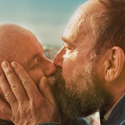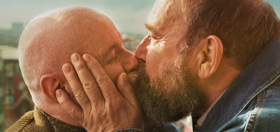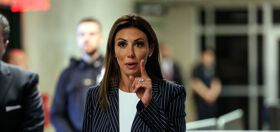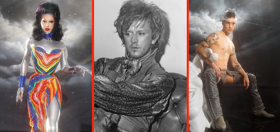
Coming out of the closet is certainly a major decision for gay and bisexual people. And that decision can be affected by or be a result of having sex for the first time or multiple times before accepting your sexuality.
Do you remember the first time you had sex with a guy? The experience of losing my virginity was far from a magical moment. In fact, it was actually quite painful.
I was 18 and living in NYC. I met the guy on a phone dating chat line while using the 20-minute free trial. I listened to several ads and then heard a male voice that aroused me and raised my curiosity to the point of finally taking action. I hailed a cab and traveled from the Upper West Side to The Village and walked into a humble but lofty apartment and was immediately led to the back patio where my host and I got in the hot tub.
After enjoying the hot water, I was pulled to his bed and bottomed for the largest dick I had ever seen and did so for not only one round, but two. It was the most physically painful yet exciting experience I had ever had sexually. And I didn’t even know his name.
How about we take this to the next level?
Our newsletter is like a refreshing cocktail (or mocktail) of LGBTQ+ entertainment and pop culture, served up with a side of eye-candy.
No part of the abstinence-only sex “education” I received in high school proved to be beneficial. I didn’t ask for a condom. I didn’t even know that I should ask for one. Some may call my behavior risky, but it didn’t feel risky to me at the time. It was exciting, scary, and the start of my sexual freedom. At the time, not one of those feelings added up to “risky” in my mind.
I did not self-identify as gay until 7 years after that first uneasy sexual experience. Yet, 7 years did not really seem that long in my mind. I am from the South and hiding my sexuality from others—making me not accept it myself—seemed like my only choice was typical of gay men my age and older. I feared being judged because of my sexuality, and losing my place in the only world I’d ever known.
From the night I lost my virginity in New York City at the age of 18, through the dozens of early sexual experiences I had with men and women in the years after it, I rarely relied on condoms. Looking back, it is crazy to me that I did not get diagnosed with an STI or HIV during that time. I got lucky, I guess. At least for a time.
I was exposed to HIV unknowingly on December 18, 2011, during a one-night stand. He and I met on the patio of Play Dancebar in Nashville. A sexy muscular guy, he was new to town. When we got to my place, we started out on the right track–he actually put on a condom. But it hurt. And we didn’t have enough lube. His stamina was failing because he was rather tipsy from the drinks we had at the club. So we pulled his condom off but only continued for under 5 minutes until a friend knocked on my condo door—ending the one-night stand with a thud. I didn’t really think much about the experience until January 2, 2012, the day I got sick with initial HIV flu-like symptoms.
I was diagnosed on January 24, 2012. I never thought it would happen to me. But it did. That is the reason that I started writing and making videos that I share on my blog, I’mStillJosh, and on social media. I did not know at the time, but I was stepping into full-blown HIV activism by simply sharing my journey and by my determination to encourage others newly diagnosed to keep living fully and talking prevention to help others stay negative, avoiding the ignorant risks I had taken for much of my youth. This was my new life, and it was a meaningful one. I didn’t come out into a world with the knowledge I needed, and I was determined to make sure others were better prepared.
Here are the things that I wish that I knew about HIV before even coming out of the closet about my sexuality.
1. New people are diagnosed with HIV every day
According to UNAIDS in 2017, there were approximately 5,000 new HIV infections per day worldwide. And young people, people of color, and gay/bisexual men were the most likely to seroconvert.
I didn’t know this fact when I first had sex. Would it have helped me make a better decision about having condom-less sex with that stranger in NYC and then others? It’s hard to know for sure, but better education about HIV certainly wouldn’t have hurt.
2. There are prevention methods that work
I never viewed condoms as particularly sexy. I learned about the importance and benefit of using condoms only after losing my virginity. Again, I received abstinence-only sexual education in high school. Although I knew what a condom was prior to having sex the first time, I had not received the sexual health training explaining how to ask my partners to use the prevention method. I was also too embarrassed to go shopping for them.
Today we also have pre-exposure prophylaxis or PrEP. You take a pill every day, and if you are exposed to HIV, there is a 99% chance that you stay negative according to Nurx, an online retailer for the prevention method. PrEP may not be suitable or right for everybody, but it is a highly effective method for those that use it to prevent HIV. Combining Prep and condoms pretty much eliminates the risk of HIV and STIs.
3. Having sex with someone undetectable should not be feared or avoided
I had always been terrified of HIV and anyone who was living with HIV before I received my own diagnosis. I’ll be the first to admit that I carelessly used the block button when I encountered someone living with HIV in a hookup or dating situation yet I was also willing to take big risks when I didn’t know a person’s status. That’s the illogic that terror and ignorance and stigma causes.
The reality is that someone living with HIV who has an undetectable viral load is not capable of transmitting HIV. This scientific fact is known as U=U, undetectable equals untransmittable. In other words, it’s often far safer to have sex with a positive person than someone who doesn’t know his status.
Not allowing fear of HIV to navigate the selection of partners based on years of stigmatizing misinformation is something that will help anyone just starting to make decisions around sex.
4. HIV stigma still exists, so be the generation that changes it
HIV stigma still exists in 2019 and its effects on the lives of people living with the virus. But it doesn’t have to be that way. As Millennials, we need to see be the first generation of gay men to defy our history of stigmatizing each other because of HIV.
5. My HIV diagnosis wasn’t the end of the world, but let’s do our best to make sure you don’t have to find that out on your own
I received my HIV diagnosis on January 24, 2012. It was the realization of my biggest fear as a guy man—HIV. It was a rough diagnosis, but it wasn’t the end of the world or even the end of my own life. In fact, it was just the start of a great life living as an out and positive gay man.
An HIV diagnosis is not what I envisioned for my life, but it is a circumstance that I found myself in. I don’t have any clichés that make help make sense of it—like ‘when life hands you a lemon, make lemonade.’
But seriously, gay men who are just starting to have sex might find it beneficial to know that life can continue even if their worst fear—being diagnosed with HIV—happens.
But if you are negative, let’s work together to make sure that it doesn’t come to that.
Josh Robbins is a sexual health activist and the award-winning publisher of imstilljosh.com. His candor (and shameless opinions) have earned him a TEDx Talk, a 2017 GLAAD Media Award nomination and over 65K followers on social media. He’s host of the #HIVscoop series and spokesperson for STI dating site DatingPositives.




















QueerTruth
Great article. Josh is great. Keep up the excellent activism. Thank you!
Kieru
I appreciate that these numbered items are broad-stroke, but when it comes to HIV awareness I think it’s worth getting into the details.
1. New people are diagnosed with HIV every day
5,000 per day might not sound like a lot because I mean there a over 7 billion people in the world right? But in context, the United States accounts for a little over 100 new infections per day. Even then that doesn’t sound like such a big risk right? But again, new infections aren’t evenly distributed. Areas of the United States that are traditionally less of economically and/or have lackluster sex education programs tend to also have higher rates of infection. Looking at you South! Certain groups are also more at risk than others. Obviously men who engage in sex with other men, but lower-income persons are more likely, minority groups (particularly young African-American men and women) are significantly more at risk. It’s important to know that a number you think is “low enough” to not be a risk, might actually be much higher for you based on your socio-economic-geographic information.
2. There are prevention methods that work
Any combination of condoms and PrEP is better than nothing at all. But a couple of factors to consider here:
– PrEP only protects against HIV-1. This is the most common strain of HIV, but there have been isolated cases of other (more aggressive) strains outside of Africa. PrEP will not protect against that. PrEP will also offer lowered or no protection against HIV-1 strains that are resistant to the primary drugs found in PrEP. So if you’re going condom-less and relying on PrEP without knowing your partners HIV strain, drug-resistance, and viral load? You’re basically gambling with your long-term health.
– The 99% is not from Nurx and it’s frankly a little disturbing that an online retailer is actually being credited here at all. 99% is the max effectiveness of PrEP as determined by the manufacturers of Truvada if the patient takes the pill every day at the same time of day. Most people will probably average a little lower.
– And keep in mind, PrEP requires adherence. If you cannot remember to put a condom on right now… are you going to remember to take a pill every day? Get your blood tested every 3 months to ensure you’re still negative and that your liver and kidney function haven’t been impacted by Truvada?
3. Having sex with someone undetectable should not be feared or avoided
U = U is another broad-stroke promotion we use in the community. Yes, it is statistically unlikely that a person with a numerically undetectable (or undefinable) viral load could infect another person. But viral loads can fluctuate based on other factors like drug adherence, stress, illnesses unrelated to HIV, etc. Knowing your partner was Undetectable last Tuesday doesn’t necessarily mean that they are today. A good rule of thumb is to ask how LONG they have been undetectable. If their last 3 appointments have been numerically undetectable then they have probably found a good routine for managing their pill adherence and their health outside of their HIV status.
4. HIV stigma still exists, so be the generation that changes it
I think it’s important that we understand that HIV+ people are just that; people. The choice to engage in sexual or romantic (or both) relationships is something that has to be done individually. Living within a serodiscordant relationship is fundamentally no different than any other; just with the added baggage. If you’re not the type of person who can emotionally handle that type of baggage recognize that pursuing a relationship with an HIV+ person may not be for you. Nothing wrong with that.
5. My HIV diagnosis wasn’t the end of the world, but let’s do our best to make sure you don’t have to find that out on your own
Today HIV is very treatable, and that treatment can be very affordable between insurance and manufacturer coupons and (depending on your income level) local / state / federal assistance. But don’t let the fact that HIV is no longer a death sentence lure you into a sense of complacency about being aware of your status and the status of your partner. That complacency is precisely why we are seeing an uptick in new infections – the fight is far from over.
Kangol
Great piece and excellent responses, especially @Kieru’s.
Thad
Knowledge is power, especially regarding HIV. Thanks for teaching us more.
Toofie
Nice article. Honest. Great work Josh!
surreal33
While truly appreciate you advocating condom and Prep.
The issue that no one talks about is mental health.
Why are so many gay men will to risk health and/or death for sexual gratification.
Why are so many gay men lacking self-love?
You can’t possible love yourself or anyone else and engaged in behavior that we know can harm yourself and others.
Vince
In his case it was just stupid youth. We were all that way at one time. The other might be drug addiction and who knows how that started. Lastly, mental health as you say. Depression or being bi polar could set you up for risk.
Kieru
The answer to your question is: Society
The closet takes a physical and emotional toll on a person and the impact it makes can take a lifetime to overcome.